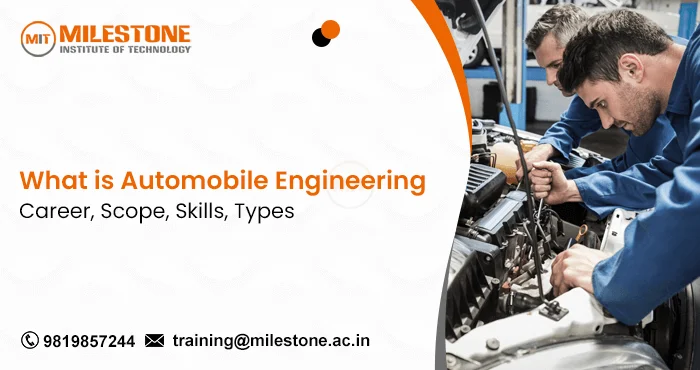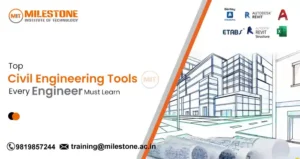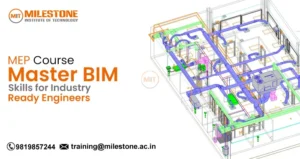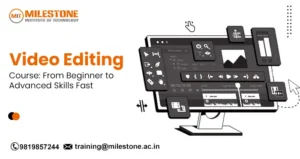In this developing modern world where automobiles are not just a means of transportation. They are a testament for human ingenuity, technological advancement, and engineering prowess. The skill of automotive engineers is evident in every sleek shape and strong engine. In this complete guide of automobile engineering we will understand
what is automobile engineering, how to make a career, what are required skills, its types, and many more.
What is Automobile Engineering?
Automobile Engineering basically comes under automotive engineering. Automotive is a broad term which refers to anything related to automobiles or vehicles in general, but
automobile refers to a specific type of vehicle that is designed for transportation on roads. There is a huge demand for high-speed cars and unique car models in today’s world. Transportation stands as a cornerstone of the economy that’s the main reason automobile and automotive engineering is the most demanding field.
Types of Automobile Engineering
In automobile engineering, professionals specialize in various sub-disciplines, each focusing on different aspects of vehicle functionality and design, and classifying the wide range of automobile types. Lets understand what are the types of automobile engineering:
- Mechanical Engineering: It is an area which focuses on the mechanical components of vehicles such as engines, suspension, as well as chassis.
- Electrical and Electronics Engineering: This involves designing and implementation of electronic and electrical systems which are build for vehicles such as powertrain control modules, ignition systems, infotainment system, and many more.
- Materials Engineering: Materials engineering aims to improve safety and fuel efficiency by developing strong and lightweight components for vehicles.
- Safety Engineering: Safety Engineering is basically focusing on the designing and ensuring the safety measures which includes airbags, seat belts, and accident avoidance systems in order to protect both cars as well as people.
- Automotive Software Engineering: Development of software system for vehicles comes under automotive software engineering which includes diagnostics, vehicle control, and connectivity.
What is the Scope of Automobile Engineering?
Automotive engineering is a broad and constantly evolving field influenced by consumer choices, technological advancements, and environmental concerns. There are various scope of automobile engineering which includes as follows:
- Vehicle Design and Development: In vehicle design, automobile engineers are responsible for every stage, from conceptualizing and prototyping to testing and manufacturing.
- Alternative Powertrains: Automobile engineers explore alternative powertrain technologies, such as electric, hybrid, and hydrogen fuel cell systems, with an increasing focus on sustainability.
- Autonomous Vehicles: In developing autonomous or self-driving vehicles, automobile engineers integrate sensors, artificial intelligence, and advanced control systems, pushing the boundaries of innovation.
- Connected Cars: With advanced connectivity features, automobile engineers design vehicles that enable seamless integration with smartphones, navigation systems, and other devices.
- Performance Optimization: Engineers in automobile industry work on optimizing vehicle performance by enhancing engine efficiency and improving aerodynamics, leading to better fuel economy, faster speeds, and improved handling.
Essential Skills Required to Become an Automobile Engineer?
There are many different skills which are required in automobile engineering. Some of the essential skills which you need to develop for becoming a professional automobile engineer are mentioned below:
- Technical Proficiency: To build a complex understanding of vehicle design and operation, a strong foundation in physics, mathematics, and engineering principles is required.
- Design Skills: In automobile engineering, individuals need to conceptualize ideas and translate them into practical designs using CAD software.
- Analytical Thinking: This is the most essential skill every automobile engineer should develop, which includes analyzing data, identifying problems, and solving problems to improve the performance and reliability of vehicles.
- Communication Skills: Communication skills play a crucial part when it comes to explaining designs and technical concepts to non-technical stakeholders as well as team members.
- Attention to Detail: Attention to detail holds significance in every design, but fostering creativity is equally crucial. Therefore, cultivating skills in both detailing and creativity becomes imperative to enhance design quality.
- Adaptability: In every field, adaptability is the most common and essential skill. To stay ahead in the ever-changing field of engineering, individuals must stay updated with new market trends and technological advancements.
What is the Difference between Automobile and Automotive?
Although both of these terms “automobile” and “automotive” are most frequently used together. But there are a subtle differences which need to be understand, some of the essential differences are mentioned below:
Automobile: Automobile is a specific term which refers to personal transportation such as cars, SUVs, and minivans.
Automotive: Automotive is a broader term which refers to a wide range of vehicles and relatable industries, such as trucks, cars, buses, commercial vehicles as well as manufacturing, sales, servicing and many more.
Basically “automobile” refers to a specific type of vehicle and “automotive” refers to the entire ecosystem of automobile and related industries.
How to Start a Career in Automobile Engineering?
To start a career in automobile engineering, one needs a combination of education, practical experience, and networking. Here are some steps to start your successful career journey in Automobile Engineering:
- Education: Obtain a bachelor’s degree in mechanical engineering, electrical engineering, or a related field with a focus on automotive engineering. For specialized positions, think about obtaining advanced degrees or certifications.
- Gain Practical Experience: Seek internships, co-op programs, or entry-level positions at automotive companies, research institutions, or manufacturing facilities to gain hands-on experience and industry exposure.
- Build a Strong Portfolio: Showcase your skills and projects through a comprehensive portfolio that highlights your design projects, research papers, and technical accomplishments.
- Networking: Attend industry events, conferences, and career fairs to network with professionals in the automotive industry, build connections, and explore job opportunities.
- Join Institute and Training Centers: Joining Institute or training center will benefit you, it will help you to boost your career journey. If you want to build your career in Automotive Design, we will recommend you Milestone institute of technology. They provide practical training, personal guidance, and many more for empowering students’ career journey.
- Stay Updated: To stay updated on the latest advancements in automotive technology, industry trends, and regulatory changes, professionals should engage in continuous learning, attend professional development courses, and regularly read industry publications.
Frequently Asked Questions
Is automobile engineering a lucrative career?
Yes, there is a huge scope in building a career in automobile engineering which actually offers a competitive salary and wide range of opportunities.
What are the job prospects for automobile engineers?
Engineers that specialize in cars can work in a variety of industries, such as government organizations, universities, automotive production, R&D, and consultancy.
What are the future trends in automobile engineering?
The future trends in automobile engineering include autonomous driving technologies, vehicle connectivity, electric vehicles and many more.




